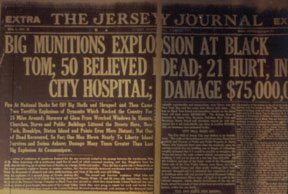 I have had a recurring dream in which I come to discover the existence of a Beatles album that I'd never heard of before. I'll be yakking along with somebody when they mention, I dunno, "Hungagunga" or something. I stop 'em: Sorry, say what?
I have had a recurring dream in which I come to discover the existence of a Beatles album that I'd never heard of before. I'll be yakking along with somebody when they mention, I dunno, "Hungagunga" or something. I stop 'em: Sorry, say what?Yeah, you know, "Hungagunga," the album that came between "Revolver" and "Sergeant Pepper"? He'll pull out the LP, and bing, there it is: A whole Beatles album that I've never heard of.
I don't know American history to the same nearly autistic extent that I know BeatleTrivia, but I do pride myself on knowing the Broad Outlines. Which is why I feel a mortification not at all dissimilar to the one in my dream, when an enormous gap in my knowledge is suddenly, embarrassingly, revealed to me. I was passing time at Fark this afternoon, and I stumbled across an article that noted that yesterday was the 90th anniversary of the Black Tom Explosion -- something that I had never heard of in my life! From the linked article, in Newsday:
The sound of the blast was unearthly, and the tremor was felt 100 miles away in Philadelphia. The night sky over New York Harbor turned orange. From Bayonne to Brooklyn and beyond, people were jolted from bed as windows shattered within a radius of 25 miles."Terrorist attack" is not quite the mot juste here -- "wartime sabotage" would be more accurate -- but let's not quibble over semantics. I lived in New York City (Red Hook, Brooklyn, to be precise) from 1982 to 1987, and had the explosion happened during my time there, it's quite possible my home might have been rained upon by shrapnel from the blast. The Statue of Liberty was badly damaged -- according to Wikipedia, the damage is part of the reason the statue's torch is inaccessible to visitors today.
The Statue of Liberty, less than a mile from the epicenter, was damaged by a rain of red-hot shards of steel. On Ellis Island, frightened immigrants were hastily evacuated to Manhattan.
Ground zero itself - a small island called Black Tom - all but disappeared, "as if an atomic bomb fell on it," says historian John Gomez.
It was 2:08 a.m. on Sunday, July 30, 1916, when what was then the largest explosion ever in the United States erupted. It destroyed an estimated 2,000 tons of munitions awaiting transfer to ships destined for Britain and ultimately, the World War I battlefields of France.
Evidence pointed to German sabotage, and some historians regard it as the first major terrorist attack on the United States by a foreign party.
And yet I'd never heard of the damned thing!
Well, I have now. And so have you.
More info is available at the Wikipedia entry.
6 comments:
Funny you mention Revolver. This week is the anniversary of its release in '66. Also the 35th anniversary of the Concert for Bangledesh.
tpxulwo - elvis's hometown
You describe just about how I felt when I first heard about the the Johnstown Flood about 6 weeks ago.
caryica: One of Paul's best love songs, from Hungagunga.
The Black Tom Explosion is new to me, as well, though I did see something on the anniversary in yesterday's Boston Globe.
The Johnstown Flood is familiar and, of course, there are songs about it too.
Being a Boston area resident for more than 10 years now, I do indeed know of the Molasses Flood.
Funny story: just last night I was walking in the East Village at 4 in the morning (geez, can't a guy get mugged in New York anymore?) when I came across a plaque commemorating the "General Slocum Disaster," which I had never heard of, although over a thousand people died. Since it took place on June 15, 1904, moreover, it gets alluded to in Ulysses. Crazy, huh?
As for the Studs Terkel thing about munitions explosions, I'm pretty sure it's in The Good War and not Working, though I mix up what's in which too.
Speaking of black men loading munitions, there were 320 men killed July 17, 1944 in Port Chicago, Calf., most of them black.
Navy, of course, blamed them.
Let's not forget Texas City in 1947.
Post a Comment